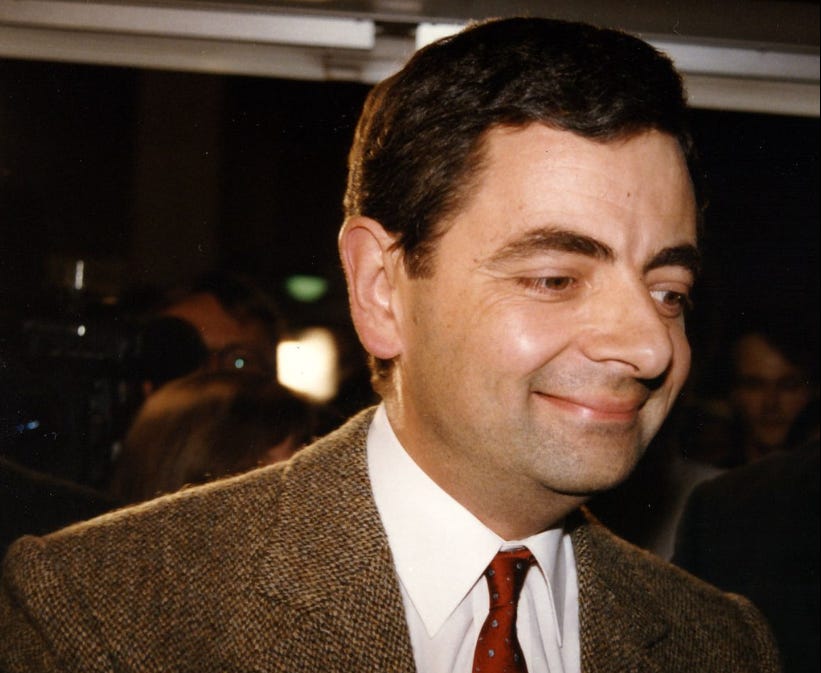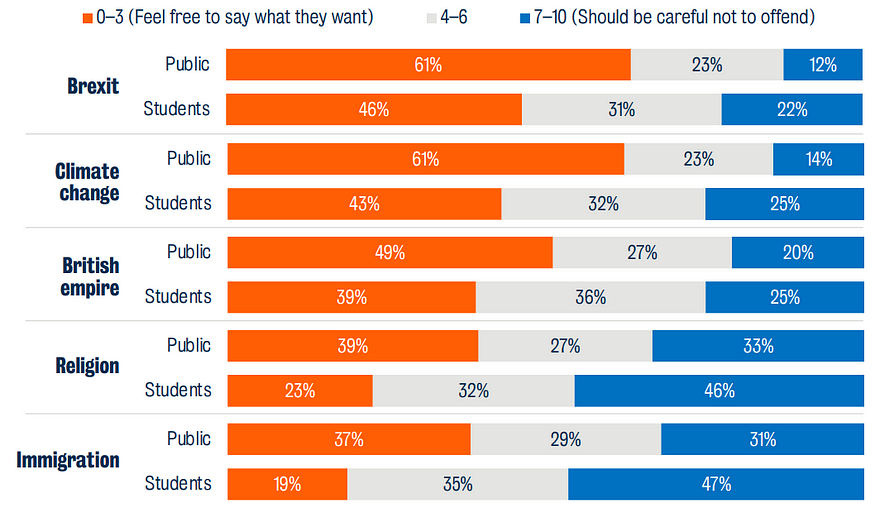A Man Famous for Not Talking Taught Us a Valuable Lesson When He Spoke About Free Speech.
You must build immunity to ‘taking offence’ because an inoffensive society isn’t free.

Society has become insufferably high maintenance.
We’re as touchy as a loaded spring.
We’ve forgotten how to argue and debate without tearing each other’s heads off, and we silence those with a different point of view.
We’re prickly to even the mildest adverse comment.
Comedian Rowan Atkinson stuttered his entire school life and was called “alien face” because of his looks.
Today, people recognise him as one of the biggest success stories ever emerging from comedy, and his costars say he’s a “comedy genius”.
Atkinson realised that his stammer faded whenever he played a character other than himself, which marked a humongous breakthrough in his acting and performing career.
Despite this, his quirky looks were the second major hurdle that got him rejected for roles.
So he created a show centred on a character that was his spirit animal and settled on the name of a vegetable: Mr. Bean.
During prime-time viewing, a UK television network gave Atkinson’s show a one-off 30-minute slot on New Year’s Day in 1990.
Mr Bean was broadcast right after Coronation Street, which in Britain is the most popular and longest-running soap opera in history.
With 13.5 million viewers sitting at home, the luck of timing and the show’s genius catapulted Mr. Bean into a household name after one performance.
The show’s masterstroke was that it broke down universal language barriers. Mr Bean would get himself in and out of awkward situations and convey this to a TV audience with facial expressions.
Growing up as a kid, I watched Mr. Bean do the most absurd things to escape socially embarrassing scenarios, which had me rolling on the floor with laughter.
He poked fun at self-destructive behaviours and traits you identify with and sometimes prefer to be kept hidden.
I’d say, “I do that,” or “I know someone who does that”.
Like when Rowan Atkinson sneezes in the church ceremony and has nowhere to wipe his nose, he awkwardly uses anything he can find and ends up using the inside of his pocket.
The man who built a career saying very little is as off the grid as they come in the modern age. Atkinson has no social media, and he makes very few public appearances.
He’s now come out to support free speech, defending your freedom to express yourself freely, regardless of how offensive it might be.
Atkinson says you must have “freedom to criticise ideas — any ideas even if they are sincerely held beliefs — it’s one of the fundamental freedoms of society”.
Rowan Atkinson has voiced his support for amending section 5 of the reform act in the UK to remove the part that says “an insult can be grounds for arrest and punishment.”
The actor even defended comments made by former Prime Minister Boris Johnson, who said: “People wearing the burka look like letter boxes”.
Rowan Atkinson — Source
“As a lifelong beneficiary of the freedom to make jokes about religion, I think Boris Johnson’s joke about wearers of the burka resembling letterboxes is a pretty good one.”
Cancel culture is a roaming mob looking for someone to burn.
Atkinson says the most potent weapon against hateful speech is not repression; it’s more speech.
Cancel culture is where a massive group of people take to social media and remove their support for public figures, which usually involves publicly shaming them.
A Harris Poll did market research on the sentiment of American voters, and 71% of people strongly felt cancel culture went too far.
69% of all voters felt cancel culture unfairly punished people for past actions. Republicans were more likely to agree with 79%, Democrats at 65%, and Independents at 64%
Atkinson has criticised the rise of cancel culture, making him an even more prominent cult figure.
Rowan Atkinson — Source
“We must be exposed to a broad spectrum of opinion, but what we have now is the digital equivalent of the medieval mob roaming the streets looking for someone to burn.
The problem we have online is that an algorithm decides what we want to see, creating a simplistic, binary view of society.
It becomes a case of either you’re with us or against us. And if you’re against us, you deserve to be ‘cancelled’.”
Not everyone agrees.
Jeremy Waldron is a legal and political philosophy professor at NYU School of Law and the author of “The Harm in Hate Speech.”
He believes that if speech offends, we should have laws that restrict it.
The general gist of his message is that in a well-ordered society, the dignity of every citizen is a privilege they should keep.
The government must uphold and protect their dignity; since hate speech or offensive speech tries to undermine the people’s dignity, laws restricting the expression of that speech are warranted.
Jeremy Waldron —Source
“By the dignity of each citizen, I mean their fundamental civic reputation, the sense that other people around them view them as an ordinary person, in good standing among other community members.
They should be treated like everyone else, not as criminals or deviants unless established by law.
It’s every person’s right to have civic status.
It’s a very mundane view that you are one ordinary person among others.
If you want a well-ordered society, you have to give people minimum assurance that they will be treated in that light by the people around them”.
Research comparing sentiment between students and the general public found that the younger generation says we need to be more sensitive to people’s views, with only 19% of students saying people are just being easily offended.
As the polling age gets older, people believe that we are too easily offended, with 40% of 55+ years olds saying so.
Regarding controversial issues, students are less likely than the public to think people can say what they want about those issues.
43% of students believe people should be able to speak their minds on Climate change, compared with 61% of the public who say the same. And only 23% of students think you can speak freely about religion.
Life’s second most precious thing
Rowan Atkinson believes the most precious thing in your life is food in your mouth and a roof over your head.
Then secondly, it’s to express yourself freely after sustaining life itself.
Using a hilarious comedic undertone, Atkinson explains that his career has allowed him to express himself freely. But he must draw on some absurdities preventing people from expressing themselves freely today.
He says, “Like the man arrested in Oxford for calling a police horse gay or the teenager arrested for calling the church of Scientology a cult. Or the Cafe owner arrested for displaying Bible passages on a TV screen”.
Rowan Atkinson says that when he came across these ludicrous charges, it reminded him of when he had been here in a fictional context on a TV show.
During a scene, Rowan Atkinson plays a racist police officer who is getting reprimanded for arresting a black man for ludicrous charges.
He recalls the scene and compares it to where we are in society today with free expression.
Rowan Atkinson — Source
“The charges for which constable savage arrested Winston Kodogo of 55 Mercer Road were walking on the cracks in the pavement, walking in a loud shirt and walking around all over the place, urinating in a public toilet and looking at me in a funny way.
Who would have thought we would live in a society that would have life imitate art so exactly.
I read somewhere the gay horse case was dropped after the arrested man refused to pay the fine, and the Scientology case was also dropped.
Someone said this was proof that the law was working well, ignoring that these cases had only been dropped because of the publicity they had attracted.
The police sensed the ridicule was just around the corner and withdrew their actions.”
Atkinson says, “What about the other cases that did not enjoy the oxygen of publicity?”.
The ones that weren’t quite ludicrous enough to attract media attention. Despite the withdrawn actions, people were arrested, taken to court and then released.
Mr Brown, who called the police horse gay, spoke to a reporter — “I am relieved the case has been dropped now. It nearly cost me my job”.
It sometimes leaves you scratching your head, thinking what a world we live in.
It isn’t a sign of the law working correctly, but it’s guaranteed to have a chilling effect on free expression and protest.
Final Thoughts.
For 30 years, Rowan Atkinson made the world happier without even speaking.
In his latest performance, he used his voice instead of poking at our self-destruct behaviours with facial expressions.
It’s the most sense on free speech I’ve heard anyone say, and it typifies the time we’re living through treading on eggshells.
Atkinson says, “So many things can be interpreted as insulting, sarcasm, ridicule, unfavourable comparison or merely stating an alternative point of view”.
If we try to contain this type of speech, it opens up a tin of worms, and it’s hardly surprising that you get an increase in interpretations of hate speech.
Instead, we need to increase our tolerance levels for expression.
Underlying prejudices, resentments and issues are not addressed by arresting people.
Atkinson believes, and it’s a point I agree with, “For me, the best way to increase society’s resistance to insulting or offensive speech is to allow a lot more of it. The strongest weapon against hateful speech is not repression; it’s more speech”.
If we want a more robust society, that must include our right to insult or offend because an inoffensive society is not free.
It’s a message worth paying attention to.



Great point of view!
The problem is not the offender, but the person offended.
We are humans, having all the time the possibility to walk away.
Or to speek out. 😉